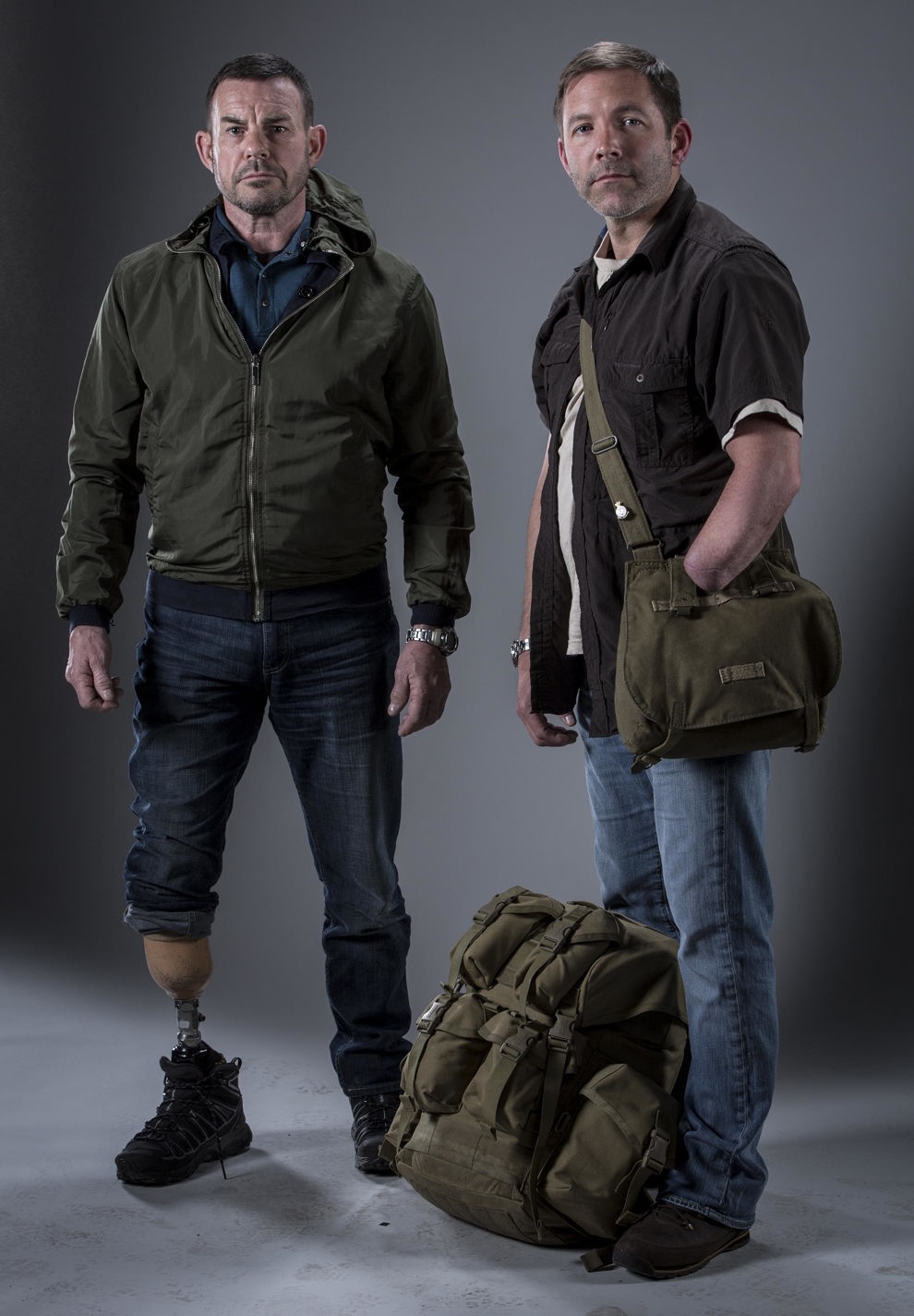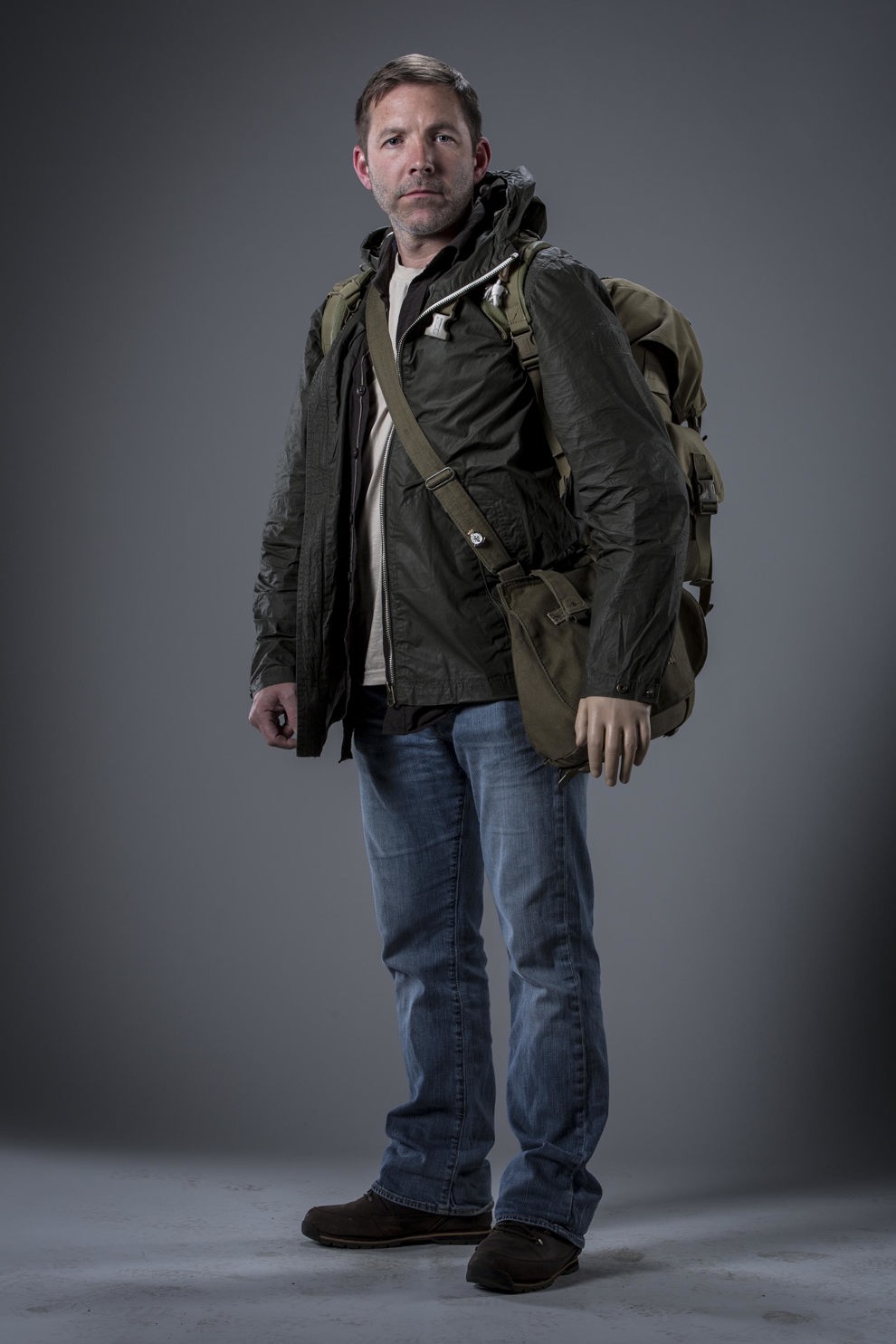Channel 4's Hunted: Meet the fugitives who went on the run for Blesma
Show your support for Kirk & Jez
- To show your support for Kirk and Jez visit their Just Giving Page
- Help them raise £5000 for Blesma, The Limbless Veterans.
To find out more about what it's like to be a member of our armed forces charity, click here.

Have you ever wondered how easy it would be to jack it all in, leave home and fall off the grid?
That’s the situation Blesma Members Kirk Bowett and Jez Scarrett faced when they applied to become contestants on the hit Channel 4 show, Hunted.
Although Kirk and Jez’s military service was a generation apart, they combined their skills to go on the run. Kirk, 38, is a former Infantryman who served with the Mercian Regiment and worked in close protection after he left the Army in 2010. He lost his left arm below the elbow in an IED attack in Iraq in 2013. Jez, meanwhile, is a 57-year-old former Royal Marine, who had to have his right leg amputated after a motorcycle accident in 1982.

Here, they tell us about their time on the run…
What was the driving force for you deciding to take up a life on the run?
Kirk: Blesma’s Fundraising Executive Zanika [Fearon] sent out an email asking Members if they wanted to apply to go on the show and try to win a share of the £100,000 prize. I wanted the chance to pit my wits against the intelligence community, as well as to see if we could win a share of the money for Blesma.
I decided to send in a video explaining what life is like as a limbless veteran. Despite my injury, I live a normal life now, but I was motivated to see if I could still do this kind of stuff. I wanted to put myself back in a military-style situation; living off the land, going out hunting, sleeping in a bivvy. I had to ask myself; ‘Can I still do this even though I’ve got one arm?’
Have you ever wondered how easy it would be to jack it all in, leave home and fall off the grid?
As military folk with more than a smidgen of fieldcraft and experience of living off the land, it shouldn’t be too tricky, right? But what if you’re being chased? What if you’re being hunted by some of the best surveillance minds in the intelligence community? That’s the situation Blesma Members Kirk Bowett and Jez Scarrett faced when they applied to become contestants on the hit Channel 4 show, Hunted.
In the second series of the reality TV programme, which hit our screens at the end of September, 22 members of the public worked in pairs as ‘fugitives’, attempting to evade capture by a crack team of former police and intelligence officers for 28 days.
Although Kirk and Jez’s military service was a generation apart, they combined their skills to go on the run. Kirk, 38, is a former Infantryman who served with the Mercian Regiment and worked in close protection after he left the Army in 2010. He lost his left arm below the elbow in an IED attack in Iraq in 2013. Jez, meanwhile, is a 57-year-old former Royal Marine, who had to have his right leg amputated after a motorcycle accident in 1982.
Three tours of Northern Ireland give you a massive insight into what you need to look for when heading into new areas.
Jez
The challenge was to spend one month on the run and successfully evade capture. What was your plan?
Jez: We decided to use third-party phones all the time, and never use our credit or debit cards – only cash. We drafted up a list of friends and contacts across the country who we knew would help us if and when the time came; we wanted to use as many Blesma Members as possible so we could highlight to the TV audience what limbless veterans go through and how Blesma helps them.
What did you do next? What was life like on the run?
Kirk: First, we totally sanitised ourselves; emails were deleted as we knew they would be hacked, mobile devices were left at home. I even bugged my own house with cameras that we could access remotely so we could spy on hunters who came to interview my wife.
Jez: We spent quite a lot of time in cars, getting from A to B, which was slow going. It took us six hours to drive from Birmingham to Cambridge via a series of B roads as we knew the A roads were watched by ANPR cameras. We spent the first night in a barn, sleeping in the straw, which was very cold. We were busy every single day. From what I gathered about the last show, there were days when people would do absolutely nothing, but we kept active.
How did your military background help and what skills did you apply?
Jez: Street patrols during three tours of Northern Ireland give you a massive insight into what you need to look for when heading into new areas. It certainly heightens your sense of perception; people who don’t look right stand out in a crowd a mile off, but you can also identify problem people who can blend in.
How did your injuries factor into the experience? Did they make it more challenging?
Jez: It’s always going to be a bit more of a challenge as an amputee because mobility is often restricted. I do tend to be a bit obsessive about looking after my injury, but as a leg amputee I have to maintain my cleanliness and manage my stump. We did a lot of walking, and in the first few days it gave me quite a lot of back pain, but then my body started to sort itself out. By Day Five I was quite happy and would have been fine walking all the time.
Whether we’re injured mentally or physically, we need people to understand what it’s like living with limb loss
Kirk
What do you think other Blesma Members can learn from your experiences on Hunted?
Kirk: Hopefully, we’ve set the bar for veterans to do their own challenges. It’s not about being injured and being taken care of. I think it’s our responsibility as veterans to keep our experiences in the public eye. Whether we’re injured mentally or physically, we need people to understand what it’s like living with limb loss. If we don’t, the public could move onto the next charity and funding for Blesma could stop. It’s also about being a role model for other people. It gives you self-confidence and proves you can still do these things.
2 Comments
daniel hall
south east londonLewis
Leave a comment
Join fellow Members and supporters to exchange information, advice and tips. Before commenting please read our terms of use for commenting on articles.